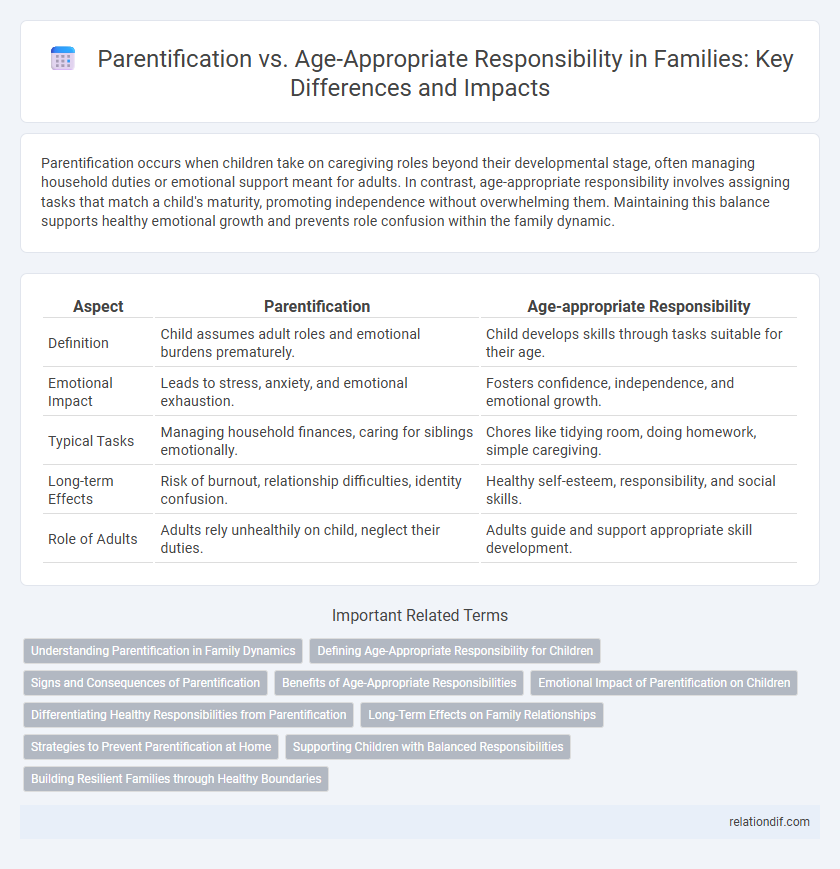Parentification occurs when children take on caregiving roles beyond their developmental stage, often managing household duties or emotional support meant for adults. In contrast, age-appropriate responsibility involves assigning tasks that match a child's maturity, promoting independence without overwhelming them. Maintaining this balance supports healthy emotional growth and prevents role confusion within the family dynamic.
Table of Comparison
| Aspect | Parentification | Age-appropriate Responsibility |
|---|---|---|
| Definition | Child assumes adult roles and emotional burdens prematurely. | Child develops skills through tasks suitable for their age. |
| Emotional Impact | Leads to stress, anxiety, and emotional exhaustion. | Fosters confidence, independence, and emotional growth. |
| Typical Tasks | Managing household finances, caring for siblings emotionally. | Chores like tidying room, doing homework, simple caregiving. |
| Long-term Effects | Risk of burnout, relationship difficulties, identity confusion. | Healthy self-esteem, responsibility, and social skills. |
| Role of Adults | Adults rely unhealthily on child, neglect their duties. | Adults guide and support appropriate skill development. |
Understanding Parentification in Family Dynamics
Parentification occurs when children are forced to take on adult roles and responsibilities within the family, often compromising their emotional development and childhood. Unlike age-appropriate responsibility, which encourages independence through manageable tasks, parentification burdens children with caregiving or decision-making duties beyond their maturity level. Understanding parentification in family dynamics is crucial to recognizing its impact on emotional well-being and preventing long-term psychological consequences.
Defining Age-Appropriate Responsibility for Children
Age-appropriate responsibility for children involves assigning tasks and duties that match their developmental stage, such as simple chores for young children and more complex tasks for adolescents. This approach supports healthy growth, fosters independence, and builds self-esteem without overwhelming the child. Unlike parentification, which imposes adult roles on children prematurely, age-appropriate responsibilities respect boundaries and promote balanced family dynamics.
Signs and Consequences of Parentification
Parentification occurs when children assume adult roles prematurely, often managing household duties or emotional support beyond their developmental stage. Signs include excessive caregiving, neglect of personal needs, and stress-related symptoms, which can lead to anxiety, depression, and impaired social development. Long-term consequences frequently involve boundary issues, difficulty trusting others, and challenges in establishing healthy adult relationships.
Benefits of Age-Appropriate Responsibilities
Age-appropriate responsibilities foster independence and self-confidence in children by matching tasks to their developmental level, promoting healthy emotional and cognitive growth. These responsibilities encourage skill-building, time management, and problem-solving abilities without overwhelming the child or causing role reversal. Establishing clear boundaries helps maintain the parent-child dynamic, preventing parentification and supporting overall family well-being.
Emotional Impact of Parentification on Children
Parentification occurs when children are burdened with adult responsibilities, causing emotional distress and anxiety that can hinder their social and cognitive development. Unlike age-appropriate responsibility, which fosters independence and confidence, parentification often leads to feelings of guilt, low self-esteem, and difficulties in forming healthy relationships. Research indicates that children who experience parentification are at higher risk for depression, anxiety disorders, and impaired emotional regulation throughout adulthood.
Differentiating Healthy Responsibilities from Parentification
Healthy age-appropriate responsibilities involve children completing tasks suitable for their developmental stage, such as homework or minor chores, fostering independence without emotional burden. Parentification occurs when children assume adult roles, like caregiving or emotional support for parents, which can lead to stress and hinder their social and emotional growth. Distinguishing between these ensures children develop resilience while avoiding overwhelming responsibilities that negatively impact their well-being.
Long-Term Effects on Family Relationships
Parentification involves children taking on adult roles, leading to emotional strain and blurred boundaries that often result in resentment and impaired sibling relationships. Age-appropriate responsibility fosters independence and mutual respect, promoting healthy communication and stable family dynamics. Long-term effects of parentification can include difficulty in forming trust and increased risk of anxiety, whereas age-appropriate roles support emotional resilience and stronger parent-child bonds.
Strategies to Prevent Parentification at Home
Establishing clear boundaries and age-appropriate responsibilities helps prevent parentification by ensuring children handle tasks suitable for their developmental stage. Encouraging open family communication creates an environment where children feel safe expressing their feelings without fear of taking on adult roles. Consistent parental support and seeking external help, such as family counseling, reinforce healthy dynamics and prevent emotional and physical burdens from shifting onto children.
Supporting Children with Balanced Responsibilities
Supporting children with balanced responsibilities involves assigning age-appropriate tasks that encourage independence without overwhelming them, thereby preventing parentification. Parentification occurs when children take on excessive caregiving roles typically meant for adults, leading to emotional stress and developmental challenges. Ensuring clear boundaries between nurturing roles and age-appropriate responsibilities promotes healthy family dynamics and supports children's emotional well-being.
Building Resilient Families through Healthy Boundaries
Parentification occurs when children assume adult roles prematurely, disrupting their emotional development and placing undue stress on family dynamics. Establishing age-appropriate responsibilities fosters resilience by promoting healthy boundaries, enabling children to develop autonomy while feeling supported. Clear role distinctions within families prevent role reversal and nurture balanced relationships essential for long-term psychological well-being.
Parentification vs Age-appropriate Responsibility Infographic

 relationdif.com
relationdif.com